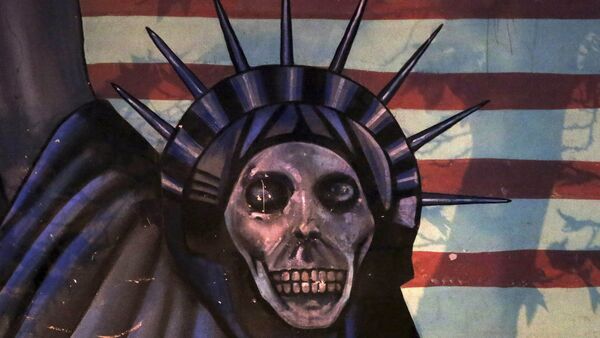Russia’s envoy to the International Atomic Energy Agency, Mikhail Ulyanov, stated on Wednesday that the US sanctions on Iran are undermining the nuclear deal checks.
Statement by the Governor of the Russian Federation @Amb_Ulyanov at the extraordinary #IAEA Board of Governors session on verification in #Iran
— Russian Mission Vienna (@mission_rf) 10 июля 2019 г.
🔽🔽🔽 pic.twitter.com/uvTMrzbiad
Ulyanov stressed that if the Iranian nuclear accord collapses, this would become Washington's fault.
6/7 @Amb_Ulyanov: The responsibility for a possible wreckage of the verification regime in #Iran will lay solely on #Washington. The negative consequences will affect the whole of the #IAEA safeguards
— Russian Mission Vienna (@mission_rf) 10 июля 2019 г.
The envoy also called on the members of the International Atomic Energy Agency to condemn the US destructive moves on Iran nuclear deal.
"We urge all Board Members to strongly condemn the destructive US policy", Ulyanov said in a statement published on Twitter.
Ulyanov pointed out that the nuclear deal's goal was not only to resolve nuclear issues but to normalise economic and trade relations with Iran, as sanctions were to be lifted gradually in exchange for Tehran keeping its nuclear program peaceful.
"It is obvious, however, that it is difficult to maintain the deal [with] only one of its two pillars. As a result, the US policy on the economic clampdown of Iran negatively affects the IAEA inspections in Iran", Ulyanov said.
Meanwhile, Iran’s envoy to the International Atomic Energy Agency, Gharib Abadi, stated that Iran is looking into all possible options regarding the country’s “third phase” in scaling down its commitments under the nuclear deal. Abadi, however, noted that no particular step has been chosen yet.
The Iranian envoy further added that the accord cannot be renegotiated, stressing that there is a delicate balance in the deal.
Washington unilaterally pulled out from the JCPOA and began re-imposing sanctions on Iran in 2018. A year later, Tehran announced its decision to suspend some of its obligations under the agreement, giving the other signatories to the nuclear deal 60 days to save the accord by facilitating oil exports and trade with Iran amid US sanctions.
Iran then announced that it would reduce its obligations under the JCPOA due to the fact that the signatory states were unable to save the accord within 60 days.
Earlier this week, the International Atomic Energy Agency confirmed that Iran is enriching uranium above the level set by the 2015 nuclear agreement. Iranian President Hassan Rouhani explained that Tehran's move was an attempt to save, not to undermine, the JCPOA.
The deal was negotiated in 2015 under the administration of then US President Barack Obama. It was signed by the US, three European countries, the EU, China, Russia, and Iran. According to the deal, Washington would remove sanctions that prevent Tehran from engaging in free trade, and Iran would significantly restrict its nuclear programme.




